How to Undo Empty Recycle Bin Windows 10

What's the first thing you do when you need some extra storage space? If you're like most people, you empty the Windows Recycle Bin, which can be done by right-clicking on its icon and selecting the Empty Recycle Bin option. But what if you later need to recover files from Recycle Bin after empty? In this article, we explain why it's possible to restore emptied Recycle Bin, and we provide step-by-step instructions on how to do it.
Is Recycle Bin Recovery Possible?
Yes, it's possible to restore emptied Recycle Bin, but not without a few special tricks. You see, the Recycle Bin is essentially a temporary storage area for deleted files. Instead of being immediately removed from your computer, deleted files are first moved to the Recycle Bin, where they sit and wait to be either automatically or manually removed. Of course, you can delete files immediately using the Shift + Delete key combination, but most users are not even aware that the Shift + Delete key combination exists.
When you finally empty the Recycle Bin in Windows 10, Windows 8, Windows 7, and older, the storage space that was occupied by the files gets marked as available, which means that other applications can use it to store data. However, until some application uses the freed storage space, the original files are still there intact, which is why it's possible to recover files from Recycle Bin after empty .

The only problem is that you have a limited time before the files get overwritten and impossible to recover. The exact amount of time you have depends on how you use your computer and how much empty space you have on your storage device. If you have just a few GB of storage space left, the chance that some application will overwrite your files is much higher than if you have hundreds of GB of storage space available.
Generally, it's best to close all non-essential applications and focus exclusively on Recycle Bin recovery. In the next section of this article, we introduce the most reliable way on how to recover deleted files from the Recycle Bin after empty and provide step-by-step instructions on how to do it.
How to Recover Deleted Files from the Recycle Bin After Empty
There are several ways how to recover deleted files from the Recycle Bin, each with its own advantages and disadvantages. Some require you to have backups of the deleted files, while others are so cumbersome that even professional data recovery specialists dislike using them. The one method that is guaranteed to deliver excellent results and can be recommended even to complete beginners is Disk Drill.
Disk Drill for Windows is a professional-grade data recovery solution that runs on Windows 10, Windows 8, Windows 7 and older. Even though Disk Drill is designed with regular home users in mind, it's loved by businesses around the world for its reliable data recovery algorithms, which can recover hundreds of file formats from all common storage devices.

Disk Drill for Windows is available in three versions: Free, Pro & Enterprise. You can recover up to 500 MB of data for free using all recovery methods and enjoy such extra features as Recovery Vault and disk backup.
The Pro version is aimed at those who want unlimited personal recovery, and it costs only $89, which is nothing compared with the price of most professional data recovery services. Finally, the Enterprise version is for unlimited commercial recovery, and it includes all Pro features plus priority support.
Steps to Recover Deleted Files from the Recycle Bin:
Step 1: Download Disk Drill for Windows and install it.
Download the Free version of Disk Drill from its website and install it just like you would any other Windows application. All modern versions of Windows are supported, and there's also a separate version of Disk Drill available for computers running macOS.

Data recovery for free
Your Companion for Deleted Files Recovery
Free Download
Step 2: Launch Disk Drill and select a disk that contains the Recycle Bin.
Next, you need to launch Disk Drill and tell it to analyze the storage device where the files were located before you deleted them by clicking on the Search for lost data button next to it. In most cases, the system drive, which is the drive that contains the operating system and all related system files, is marked with the letter C, while other storage devices are marked with letters D, E, F, G, and so on.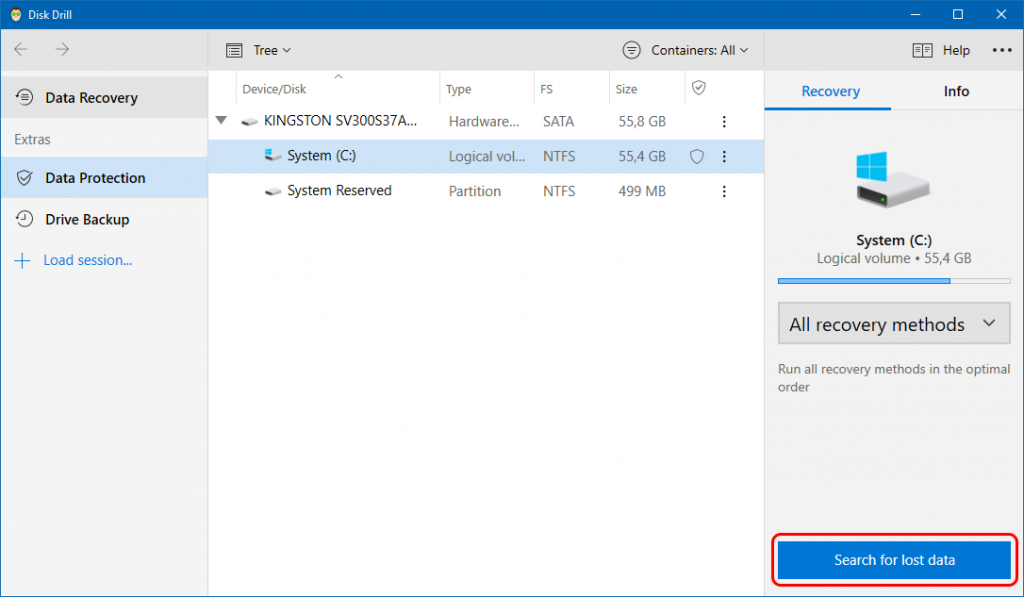
Step 3: Select files for recovery.
Depending on the size of your storage device, it may take Disk Drill a few minutes to finish scanning. Once it's done, you will be presented with a list of deleted files. Using the filters on the left, you can narrow down the scan results so that you have an easier time marking the files you want to recover. Then click on the Recover button.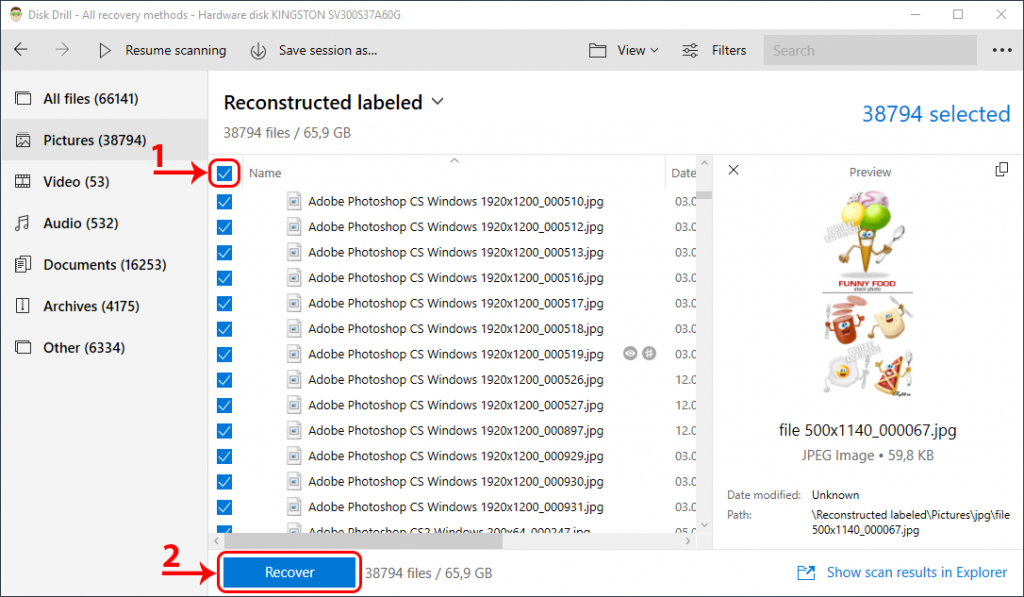
Step 4: Specify the recovery directory.
Disk Drill allows you to choose where you want to restore the deleted files, and it's highly advisable to select a recovery directory that's not on the same storage device as the files you want to recover.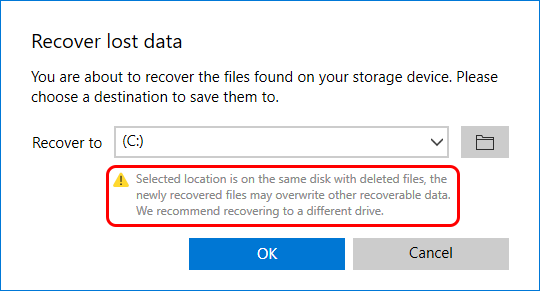
Step 5. Begin the recovery process.
With your files selected and the recovery directory specified, you can begin the recovery process. The actual recovery shouldn't take more than a few moments to complete.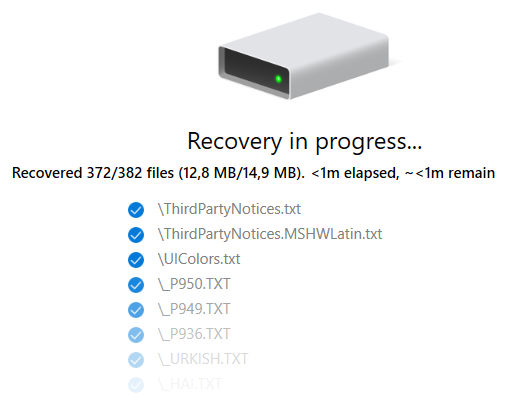
Video Tutorial
FAQ
Disk Drill for Windows allows you to recover 500 MB of data for free, which is more than enough for countless Word documents, over 100 songs, or a couple of smartphone videos.
All recent versions of Windows come with a useful backup feature called File History, which automatically backs up selected directories. Provided you've activated File History before you deleted your files, you should be able to easily access their backups.
To recover deleted files from the Recycle Bin without software:
- Open the Start menu and type "file history".
- Select the "Restore your files with File History" option.
- Click the History button to show all your backed up folders.
- Select what you want to restore and click the Restore button.
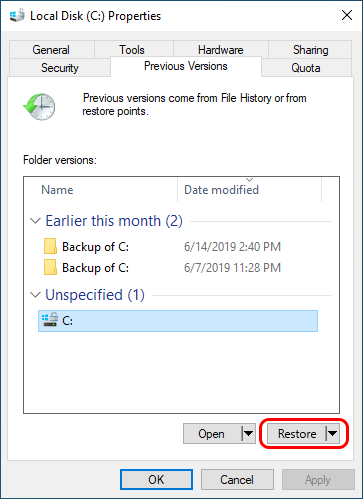
Yes, there are. Disk Drill isn't the only data recovery solution for people wondering how to recover files deleted from the Recycle Bin, but you would be hard-pressed to find one that can rival its ease of use and reliability. What's more, you can use Disk Drill to recover 500 MB of data without paying, so there's really no reason not to give it a go.
The amount of time you have to recover your data after emptying the Recycle Bin depends on several factors, mainly the size of your storage device and the number of read/write operations performed every minute. To maximize it, you should close all running applications and focus your attention exclusively on data recovery.

Jeff Cochin
Jeff Cochin is a data management and recovery expert. He also serves as a technical writer, testing and reviewing tech solutions in various fields.Jeff Cochin is a professional data management, warehousing and recove...
Read full bio
Jeff Cochin is a data management and recovery expert. He also serves as a technical writer, testing and reviewing tech solutions in various fields.Jeff Cochin is a professional data management, warehousing and recove...
Read full bio

This article has been approved by Brett Johnson, Data Recovery Engineer at ACE Data Recovery. Brett has a Bachelor's Degree in Computer Systems and Network, 12 years of experience.
This article has been approved by Brett Johnson, Data Recovery Engineer at ACE Data Recovery. Brett has a Bachelor's Degree in Computer Systems and Network, 12 years of experience.
How to Undo Empty Recycle Bin Windows 10
Source: https://www.cleverfiles.com/howto/recover-files-from-recycle-bin-after-empty.html